Daru September 6, 2014: Jesus is a Black Man
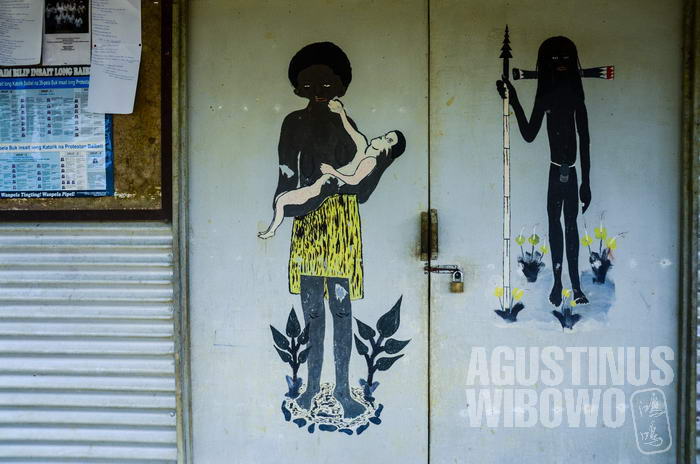 Papua is the center of the world, the God’s sacred and chosen nation. The day will come, when the black people no longer be the slaves, and the whites in turn will be the slaves of the blacks. That’s how Dogen Molang sees the future of the earth, based on the ancient story he believes. He is now conducting a secret yet important research. That is, to prove that Jesus was a black Papuan man.
Papua is the center of the world, the God’s sacred and chosen nation. The day will come, when the black people no longer be the slaves, and the whites in turn will be the slaves of the blacks. That’s how Dogen Molang sees the future of the earth, based on the ancient story he believes. He is now conducting a secret yet important research. That is, to prove that Jesus was a black Papuan man.
Mr. Molang is an enthusiastic man in his forties, a respected English teacher in the Daru High School—the only high school on the tiny island of Daru, the former capital of the isolated Western Province of Papua New Guinea. The first time I met him, he came with thick photocopy thesis of an Australian researcher about the border area of Papua New Guinea. In one chapter of his thesis, Kevin Murphy the researcher described the folktales of different tribes in the area on how the universe was created. The stories captivated Molang very much, and made him jump to the conclusion: that Jesus were born here, in the land of the Papuans.
“We believe that the creation story is our story,” he said, “But our story was twisted by the Greeks and the Jews who rewrote it as the Bible. Now it’s our duty to unveil our own story.”
Papua New Guinea is a very diverse nation, with 820 languages and thousands of tribes. Interestingly, most of the tribes have their own version of genesis stories on how the universe was created. These creation stories, in this area of southern Western Province, is known as mabun stories.
When I was in Tais—a village near the Indonesian border, westward of Daru—an elder man told me their secret and sacred mabun story. The universe, they believe, started from a giant tree, where the human beings were living on its branches. The tree was then burned, and the people from the branches were jumping out from the tree to all corners of the world. They then became the ancestors of people in the world. Later, came two brothers to the site. The elder brother was black and the younger was white. The elder brother shot the burned tree with his bow and arrow. Suddenly, water came out of the tree, and made the two brothers ran away in panic. The elder brother ran to the north, and the younger brother ran to the south. The water then became the sea that separated Papua New Guinea from Australia.
Kevin Murphy collected those kind of mabun stories from different villages in the South Fly District of the Western Province, and concluded that the mabun was an important identity component of the people in this area. But for Molang, mabun is much more than that. The mabun is full of mysteries that await a person like him to discover.
The key reason for this was, the stories from a dozen tribes who didn’t understand each other’s languages and had no interaction with each other of course are different, but amazingly they share high level of similarities. The stories about the big tree, black elder brother and white younger brother can be found everywhere in the region. How can the stories be so coincidental? This bizarre coincidence for Molang is not coincidence at all—the mabun is much more than a story; it is history.
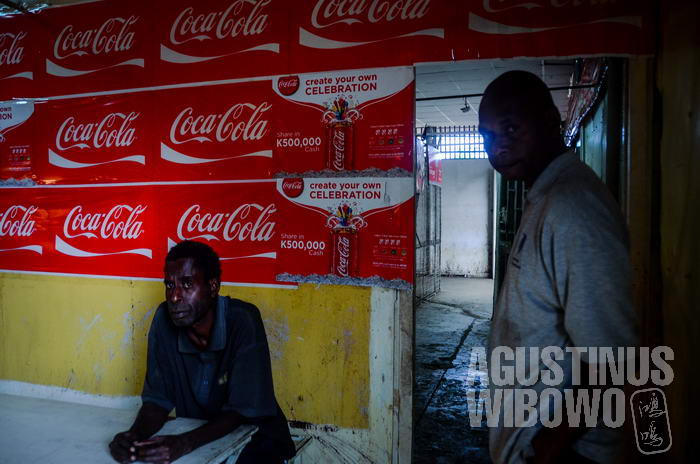
Mr. Molang (right)
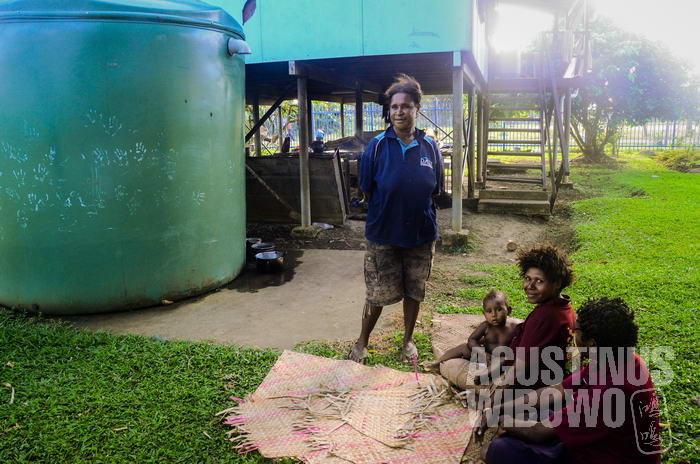
Mr Molang family lives in a quite well-maintained teachers housing complex in Daru.
“The story of our people, the story of Mingkad, is the most superior story,” Molang said, “The creation took place before the giant tree story, before the story of the cutting of the tree and people jumped out of the tree.”
“In our story,” he continued, “the black man is the first son of God and white man is the younger brother. For some reasons, the blessing was given to the younger brother, the white man. All blessings, knowledge and wealth and everything actually should be ours, the black men’s. But God cursed us so we are living this way now.”
And how this mabun related to Bible? “This is seemed like Cain and Abel story. But I believe this is actually the story of human sacrifice (of Abraham). God asked for the sacrificing of human being. But the black men were scared, and sacrificed none. Meanwhile, the white men, the younger brothers, agreed to God’s request and sacrificed themselves. Thus they received all blessings from God.”
Molang has another theory on why the black were cursed while the whites got blessing. “Jesus was a black man. But we, the black men, killed him. He was killed here. That’s why God punished us by being poor and having no knowledge.”
Molang’s method of acquiring his theories is by connecting portions of his ancestral story with portions of Bible stories. Like how he explained that the story of the burned tree and people were jumping out of the branches and populated the whole world, preserving different customs and speaking thousands of languages, was actually the Papuan version of the Tower of Babel story.
“God was angry, so He disunited the human being by confusing their languages,” explained Molang, “That is why the name of the languages in this area: Agop, Na, Nama, Ende, all means What? in respective languages. But my native language is Tame, of which name means Confusing!”
(I have my own theory on why the name of the languages in the region means What? Once upon a time, white linguists came to the region and asked the natives the name of their languages. The natives did not understand the white men’s language, so just replied with What? in their respective tongues. Thus, the whites thought it was the answer they were seeking. Of course I didn’t confront this with Molang’s.)
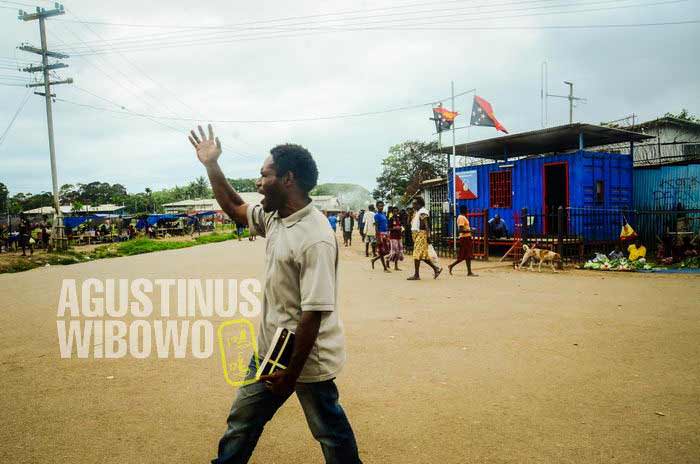
Preachers spread Good News everyday in the busy Daru main street.
As for Molang, he believed he has enough proof that the story of Tower of Babel happened in Papua—a land of hundreds of languages. The same for the Noah’s story, as near the Mai Kassa river there is a village called Dimiri, of which name in local tongue means “rainbow”, just as God promised Noah about no more flood punishment by giving rainbow after the rains.
“Jesus was born here,” continued him, “You can see this in Mingkad story. Creation story took place in Mingkad. Mingkad is the place where God created everything, and where the Garden of Eden was located. The word ‘Eden’ in my language means ‘I dug’, a reference to God creating a man out of the ground, to make human beings.”
Mingkad, believed by the tribesmen in Molang’s homeland of Sibidiri, is a sacred land near the Mai Kassa River, on the way to Sibidiri. Half of the soil is black, and the other half is red. “We are the custodians of the place,” said Molang, “we are the Chosen People, the guardian of the story. In Bible you can find about the Levites. We are the Levites, as we are the voice between God and human being.”
In Mingkad, as they believe, is the place where God created everything: gun, gunpowder, bullet, plane, boat. “But all of those were given to the white men. It was supposed to be given to us, the black men. Now we are still living as bush men, with bows and arrows. But as I told you, the white men have stolen God’s blessings from us.”
Molang’s daughter Margaret visited the sacred place in last year’s Christmas holiday. The place is in a forest on a hill. The place is so sacred, that normally the villagers always avoid the area and prefer to make a detour rather than being anywhere close to it. Margaret testified that there the river was red and blue, and she heard noise of a busy market, despite of being in a tranquil forest. She also heard noises of boats and planes, which meant a boat or a plane was departing or coming in any of the Western countries (America, Australia, Germany, etc). She saw nothing but she heard everything.
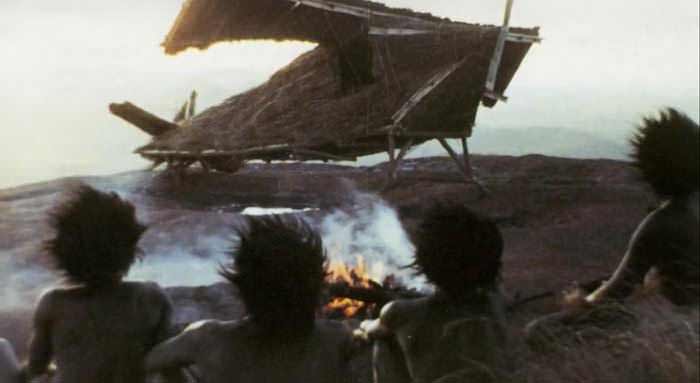
Melanesian Cargo Cult
Somehow, all the stories told by Molang—a well-respected and educated man of Daru—reminded me to the “cargo cult”. The English phrase to refer to inability to make the correct logic between cause and effect, was actually originated in the Melanesian world of Papua New Guinea. Back then, during the World War II, the Allies used Papua New Guinea as their supply base. The Melanesian tribes were amazed to see the Allies’ modern airplanes, which they could not explain why and which made them questioned why this technology belongs to the whites and not to the blacks. The planes brought cargo, and the blacks also wanted the cargo. They then built planes from wood and bamboo, conducted their sacred rituals around the planes, while hoping the real plane and the cargo will come from the sky.
Molang was very much bothered with any reference of his ancestor story to cargo cult. “The term cargo cult is white men’s trick to dilute our story, our valid God creation story. In the sacred places, you can hear the noise of planes, trucks, ships, but you see nothing. This explained that there are spiritual world and physical world, and our place is the gate of the two dimensions. We believed that all inventions and everything happened in our land, and white people came to take the cargos away from us.”
But, isn’t that still a cargo cult? In rather modern, or Biblical, explanation?
“I believe white man knows this secret but not telling us. And it will come the time that God will come back to us,” said Molang.
God will turn His face to the black man. The proof is, now the Western Province, the least developed in the country, sees the highest fastest level of development. Researchers had confirmed that most of the resources is deposited here in West Province, especially in South Fly district. The biggest of oil, gas, gold, diamond are here in South Fly. There is a belief that if we are going to drill oil here, the oil of Middle East will be dried up, and it will all come back here.
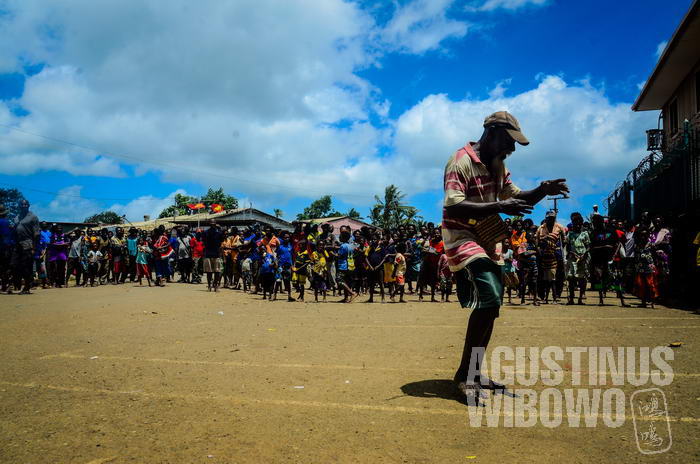
Papua is believed as the land of milk and honey.
“Bible said,” Molang said, “God will take you to the land of milk and honey. People will come from east, north, west, south, to here. The first will be the last, the last will be the first. Many texts in the Bible come to this interpretation. Daru will be town of Nazareth, where Jesus will come back.”
He made me dizzy. Molang is a very devout Christian, of the Seventh Day Adventist denomination which respected Saturday as their Sabbath. On Saturdays, they refuse to do any kind of work, to travel, to make fire. “With all your theories, aren’t you afraid of being condemned as heretic by the Church?” I asked.
“I am not disputing God, but I am disputing creation story. I am disputing the place. I believed that the story is our story, and distorted by white people. Bible story is parabolic, and the white men are hiding the truth for us.”
Molang dreams to conduct a monumental research, to visit all sacred places of the Melanesians all the way to West Papua and Maluku (the Moluccas) in Indonesia to track his ancestors’ story. He also dreams to visit Java and Thailand to find the stories to answer a vital question: where Papuans came from and how they ended up in this island. Of course, he dreams to visit Israel, too, to proof the ultimate truth of his belief.
“God is our God,” he said, “but He cursed us and went to other place. I don’t believe civilization started in Europe, because everything was created here in Papua but God took away everything from us.”
“You believe that God will come back to you?” I said.
“Yes!” he stated firmly. “That day will come. In five years Daru will be like Dubai. We have oil, we have gas. When I was younger, I used to dream to go to Australia. But now I am just waiting the whites instead to come here, to be our slaves and to clean my shoes.”
“What you have to do to make God to return back to the blacks?”
“God will turn His face to us automatically, so we are just need to be patient and wait. But, some preachers said, the only way to make God to turn back to us is by us going back to God, meaning to be stronger Christians. In anyway, God will return.”
The man continued his waiting.
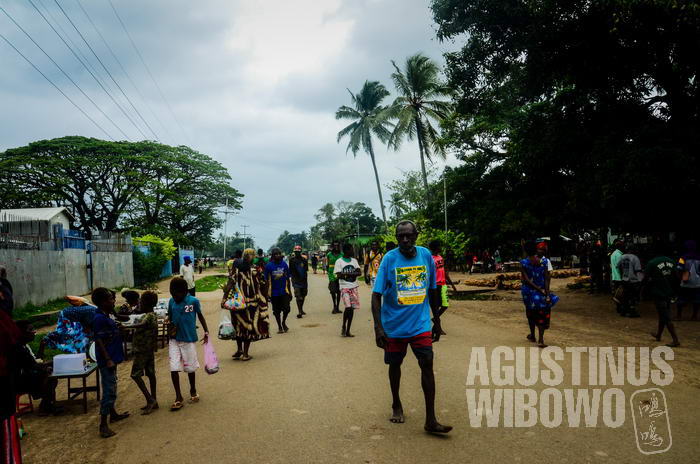
Mr. Molang believed that in five years Daru will be like Dubai.

Currently, economy and businesses in Daru are dominated by those coming from Mainland China






Cargo cult…? Hehehehehe yo enek to tibae…more knowledge from your story mas agus…thanks alot
Kak Agus, have you heard about the Out of Africa theory for modern human migration? It might explain the dawn of civilization in Melanesian region, which is much much earlier than the so-called white people.